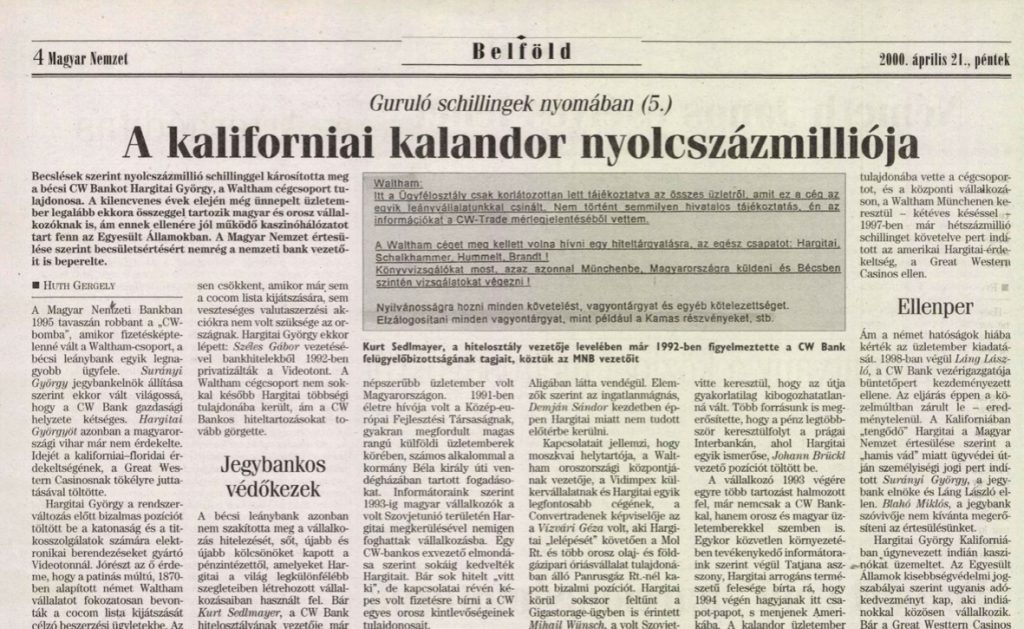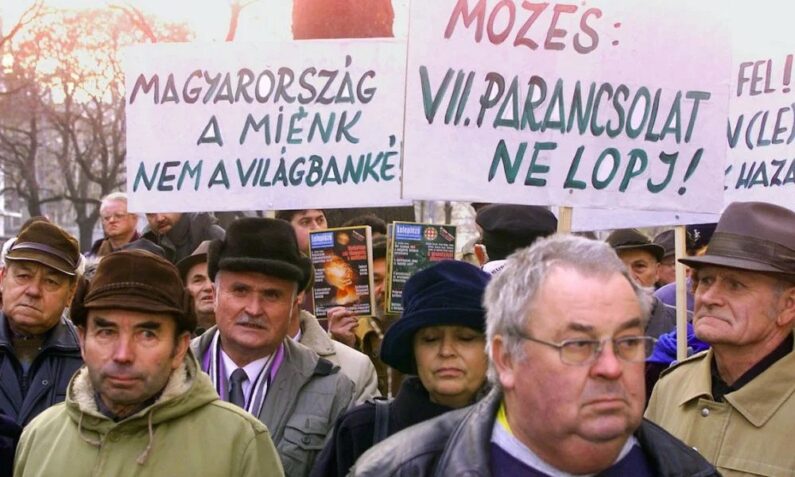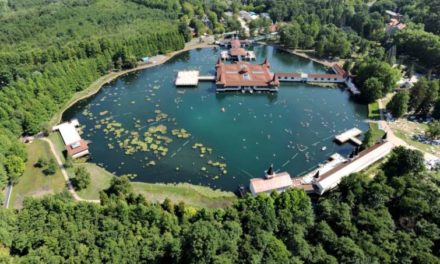The historian Zsuzsanna Borvendég's series was originally published on the PestiSrácok website, but there are certainly those who missed it. But those who haven't read all the parts should also read it again. Knowing the whole picture, can we understand how we got here?
According to some opinions, the successful entrepreneurs who became rich as winners of the regime change came from the well-educated technocrat layer that appeared in the late Kadar period. On the other hand, there is less talk about who and how the "technocrat" layer was formed in the 1980s. Who had the opportunity to become familiar with capitalist business policy and where could they get capital (and information) to hastily "privatize" and then start businesses both at home and abroad? These are difficult questions to explore, but we know one thing for sure: talent and diligence were not enough for all of this.
In recent decades, it has been revealed that several high-profile entrepreneurs who became rich in the 1990s had thousands of ties to the communist secret services in the past. This was also the case with György Hargitai , who sat on the board of directors of the foreign trade company Videoton together with Piroská Apró , and who, after his assignment in Moscow, took over the management of the West German company Waltham at the end of the seventies. In the past few weeks, you have been able to read a lot about the great Waltham scandals of the seventies and eighties (only the ones about which documents have survived, of course), now let's see what happened after the model change!

Montage: Gondola.hu
When CW Bank in Vienna went bankrupt
The biggest scandal of 1999-2000 was the bankruptcy of CW Bank. The financial institution, which accumulated a loss of around seventy billion (according to some sources, nearly one hundred billion) HUF, was the Vienna branch of the Magyar Nemzeti Bank, which during the Cold War focused on financing East-West trade, while also dealing with the financing of secret service operations and illegal money transfers related to embargoed shipments . After the collapse of the bloc, it accumulated its unaccounted deficit with suspicious loan placements.
What made these contracts suspicious? CW Bank had contact with few clients, and they all came from Eastern Bloc companies with a murky past (meaning: presumably linked to the rescue of former communist secret services). Lending was carried out without formal requirements ; according to eyewitnesses, the money flow was recorded on "cheese paper". In the absence of valid contracts and records, it was not possible to collect the debts and there was no liability.
In the end, the MNB consolidated the losses of the financial institution, that is, we, the taxpayers, were also responsible for the large-scale theft carried out using CW Bank.
Hargitai and the rolling dollars
Hargitai and Waltham appear in connection with CW Bank in such a way that when the scandal broke out, the largest debtor was the owner of the former Videoton subsidiary, which was already in private hands at that time. During the system change, Hargitai bought the company under his control and started adventurous and expensive deals using its wide network of contacts.
In investigative newspaper articles of the time, we can read that Waltham immediately moved its headquarters to Cyprus, which is considered a tax haven, and from there founded subsidiaries in Budapest and Moscow. As the head of Videoton's Moscow office, Hargitai had to be in contact with the Soviet internal affairs and/or military intelligence service , and after being posted to Munich, the management of embargoed shipments also assumes an intelligence background.
His existing network of contacts remained even after the change, and he already got a taste of the gambling industry: he was the first to start selling scratch-off tickets in the Russian capital - we can learn from Gergely Huth's series published in 2000, in which he investigated the rolling schillings. The article also reveals that " the Afghan Veterans' Organization also took part in the distribution for the sake of tax exemption".

Part of a series of articles. (Source: Hungarian Nation)
The Swiss connection and Modultechnika
After his adventure in Russia, he went to the United States, where he started to found casinos, rethinking the small-scale sale of lottery tickets. His business partner was the Swiss-based Urs Hansel , whose name was mentioned in the previous section. Together with Hansel, Hargitai already established companies in the West in the eighties, which appeared as subsidiaries of Waltham; In addition to Switzerland, such a company also operated in Liechtenstein. The main "attraction" was, of course, evading the embargo, but under the guise of this, they took advantage of the opportunities that socialism could provide for the privileged: they took advantage of the "powerlessness" of state-owned companies to loot the Hungarian economy.
They robbed the country with a clever trick
According to state security data, the Swiss SCS GmbH (Strafa Control System), owned by Hargitai (or officially Waltham) and Hansel, established a manufacturing company in Hungary under the name Modultechnika Kft. in the second half of the eighties. The state company Elektromodul and Hírszöv (Hírádástechnikai Szövetkezet) also appeared as co-owners in the founding, i.e. apparently it was a joint venture with Hungarian headquarters and western participation, but as we can see, behind the western partner is actually a Hungarian-linked company, Waltham, i.e. a subsidiary of Videoton was standing
The factory's products were purchased by SCS, and then offered for sale to Elektromodul as a foreign partner. They understood well. There was a factory in Hungary whose foreign co-owner bought the manufactured products (presumably he was able to negotiate a fairly favorable price with himself, as the owner), and then sold it to the Hungarian co-owner of the factory, Elektromodul. The products produced by Modultechnika in Hungary were thus ultimately used in Hungary, but with the unnecessarily entered into export deal, they achieved that SCS returned the product to Elektromodul at a five to ten times premium, which actually, as one of the owners of the manufacturing company, could have had direct access to the products.
Remember, we are in the 1980s, so Elektromodul was state-owned, that is, capital was withdrawn from the Hungarian economy with this fraud, moreover, Modultechnika was partly owned by state-owned companies, that is, the cost of production was not borne by the Hargitai-Hansel couple. What can we say about this construction: the negligence of entrepreneurs (technocrats) blessed with great business sense and talent, or the abuse of red barons supported by the secret service of a dictatorial regime? Another poetic question.
Casino business in California
In the mid-nineties, the familiar business partners tried their luck overseas as well: they opened casinos in California, the state where gambling was prohibited. How could they do this? Somehow like in Moscow before, where they enjoyed a tax discount for the veterans of the Afghan war: they took advantage of a loophole through which the local legal order wanted to help indigenous people living in a disadvantaged situation. The Indian reservations had a specific legal background, in which tribal customary law was also given room, so the businesses in which Indians were also associated received unique assessment. The casinos were built with a loan from CW Bank, and according to press reports, by 1994 they were already bringing in tens of millions of dollars in profits. However, the profits did not allow Hargitai to pay back the debt he had accumulated at the Vienna bank branch, so at the time of the bank bankruptcy, the owner of Waltham owed 800 million schillings to the MNB subsidiary. This was also "consolidated" from our tax forints.
In the background is the Apró-Dobrev clan
György Hargitai returned to Hungary after these adventures, as his old comrades came back to power in 2002. Klára Dobrev , as the new prime minister's chief of staff - and Péter Medgyessy , the prime minister's wife - represented exactly the relationship system that opened the doors of opportunities for Hargitai.
In the 1970s and 1980s, Piroská Apró was a member of the Videoton/Vidimpex board, and in the 1990s he also did business with the Bulgarian circles that entered the Hungarian markets with the help of Apró-Dobrev Petar Dobrev was one of the leaders of the Bulgarian Izotimpex (Bulgarian equivalent of Videoton), so his secret service connection can hardly be questioned. Supported by the former Soviet, Hungarian and Bulgarian communist state security network, Hargitai successfully converted his positional advantage into real capital. In all of this, not only the Apró-Dobrev couple were partners, but also Antal Apró himself, the gray eminence of the Kádár system, one of the controllers of the 56 reprisals, with whom they jointly founded a security company in Hungary in the early nineties.
The 2000s were not without scandals either. In 2003, it caused a big storm when the Mágnáskert restaurant, owned by Hargitai, delivered lunch to a government seat in Söjtör. Measured in the gold price, the eel became famous as "robber meat" in the opposition media.
An unattainable advantage at the start
But he also made it to the following decade from legally debatable enterprises: Hargitai was last accused of fraud in 2014, in connection with the spa investment in Egerszalók, the details of which are completely out of the scope of this series.
My aim was only to present a picture of my career, showing how false the narrative is about professionals blessed with exceptional talent and the interplay of coincidences of "being in the right place at the right time". Hargitai's story can be said to be typical, and although it has happened in small, less significant companies that the state company was privatized through the cooperation of the workers, unfortunately this was not typical. The majority of "entrepreneurs" were able to get a hold of the threshold of the new world with network relations systems and political and financial background support; an average Hungarian citizen had no chance to compete with them. At the start, they started with such an advantage that they were out of sight for those standing at the starting line.
Source: PestiSrácok
Author: historian Zsuzsanna Borvendég
(Cover photo: MTI/Noémi Bruzák)












